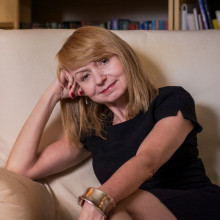Polish literature

Elżbieta Isakiewicz
(born 25 February 1958 in Sopot) - prose writer, reporter, essayist.
A Polish philologist by profession. She started her journalistic path in the student weekly "itd.", a literary path - when she was still a teenager, winning a competition for diaries of the weekly "Na Przełaj". With Piotr Wierzbicki, she co-founded "Gazeta Polska" weekly and, in 1993-2005, she was the deputy editor-in-chief. She published her columns and reportage in several magazines, namely "Tygodnik Solidarność", "Newsweek", "Duży Format", and "Tygodnik Powszechny". In the development of her writing, she emphasises the key role of her experience as a reporter, which opened her ears to the spoken word and intensified her gazelove (Dostoevsky's term), this means an all-consuming compulsion to observe, resulting in the perception of details, of what is seemingly unimportant, allowing one to trust intuition in the description of human behaviour and states of the soul.
Isakiewiecz is an author of eleven books, the most important of which are Kaprys. (Przy)powieść o mężczyźnie i kobiecie (”Caprice. A Tale of Man and Woman”), Kocio (”Feline”) – a species-polyphonic fantasy about human-animal relations embedded in reality, Lekkie halki czarownic (“Lightweight Witch Slips”), and Niewyśnione historie (”Unaccounted Stories”) - a collection of micro novels that could be placed between prose and poetry, reportage and short story, as well as, above all, Piekło ocalonych (“Hell of the Survivors”), published by the State Publishing Institute PIW, the result of almost two decades of work, a book containing the shocking stories of Polish Jews who survived the war, supplemented over the years.
She is a winner of, among other things, the Association of Polish Journalists Award, banned under martial law, for social reports published in "itd." (1983), the Minister of Culture and National Heritage Awards (2000) for the book Ustna harmonijka. Relacje Żydów, których uratowali od Zagłady Polacy (“Harmonica: Jews Relate How Poles Saved Them from the Holocaust”), and the EU Journalist Award in the 'Together against discrimination' competition (2011). Nominated for the Mackiewicz Award for Czerwony ołówek ("The Red Pencil") - a historical reportage about Henryk Sławik, a Polish diplomat who saved thousands of lives in Hungary during the war.
Lover of cats, jazz, classical music, great Russian literature (especially Chekhov) and Hungarian literature (especially Sándor Márai).
Recently, she has submitted for publication Opowieści przyziemne ("Tales of the Mundane") - a volume of short forms whose protagonists are various kinds of freaks, as well as phenomena from this, but a little bit not from this land.
Bibliography:
- Wołanie o pomoc. Warsaw: Młodzieżowa Agencja Wydawnicza, 1988.
- Liczenie słoni. Warsaw: Nasza Księgarnia, 1990.
- Przyszli po nasze głowy. Komorów: "Antyk", 1993.
- Afery, UOP, mafia. Komorów: "Antyk", 1993.
- Ustna harmonijka : relacje Żydów, których uratowali od Zagłady Polacy. [collected and compiled by Elżbieta Isakiewicz]. Warsaw: Niezależne Wydawnictwo Polskie, 2000.j
- Czerwony ołówek: o Polaku, który ocalił tysiące Żydów. Warsaw: Niezależne Wydawnictwo Polskie, 2003.
- Ulicznica. Warsaw: Oficyna Wydawnicza Volumen, 2010.
- Kaprys (Przy)powieść o mężczyźnie i kobiecie. Warsaw: Wydawnictwo Sic!, 2013.
- Lekkie halki czarownic i inne mikroopowieści. Ostrów Wielkopolski: Perspektywa, 2015.
- Niewyśnione historie. Warsaw: Wydawnictwo Sic!, 2017.
- Kocio. Warsaw: Wydawnictwo Sic!, 2018.
- Piekło ocalonych: Państwowy Instytut Wydawniczy, 2019.